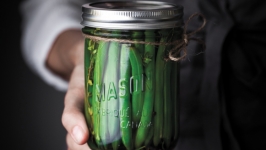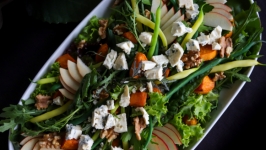Get Pickled!
Whenever I smell hot vinegar, I’m reminded of my childhood. Each September, my mother and I would spend days peeling crates of pearl onions and prepping late summer vegetables for pickling. The process seemed rather complicated to my younger self, but it turns out creating bright crunchy pickles at home is actually surprisingly simple.
Two Ways to Pickle
A quick Google search reveals countless ways to create the perfect pickle, but there are only two main methods to consider: salt-water brining or immersion in a vinegar solution. I prefer the latter.
Salt-water brining, also called lacto-fermenting, involves beneficial bacteria converting a food’s natural sugars and starches into lactic acid. This forms an acidic and probiotic-rich brine which prevents spoilage.
Vinegar pickling, sometimes called quick/refrigerator pickling, uses an already acidic solution (vinegar) to create an optimal preserving environment.
While the vinegar method lacks the beneficial bacteria and depth of flavour of fermentation, the process is faster and still produces a crunchy flavourful pickle. If lacto-fermentation seems intimidating, the vinegar or quick-pickling method might be your ticket to savouring summer flavours this fall.
Quality ingredients
Regardless of the method you choose, great pickles start with great ingredients. You want to choose quality produce that’s fresh, mature, and blemish-free. As autumn sets in and the abundance of summer fades, it’s a good time to gather the last of the fresh produce and start preserving for the days ahead.
If you’re new to the science of pickling and preservation, I recommend reading up on the topic (see sidebar). As with any preservation method, it’s important to know the best practices for avoiding contamination and understanding when a preserve may not be safe to eat. (Quick pickles are generally very safe—I keep mine in the fridge for up to two months!—but if you notice any mold, fizzing, clouding or other unattractive things, aim for safe over sorry.)







